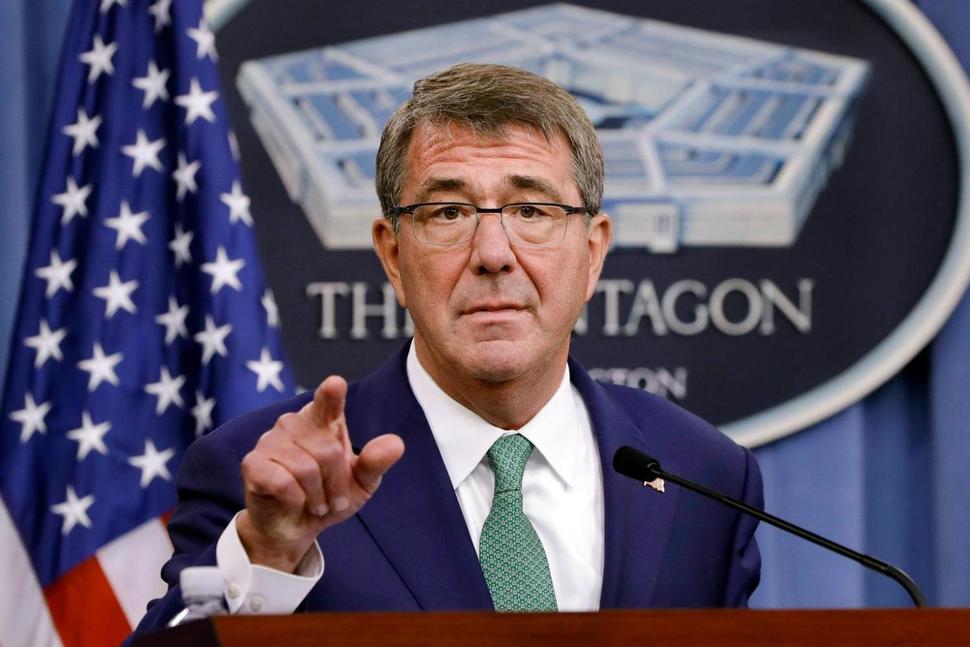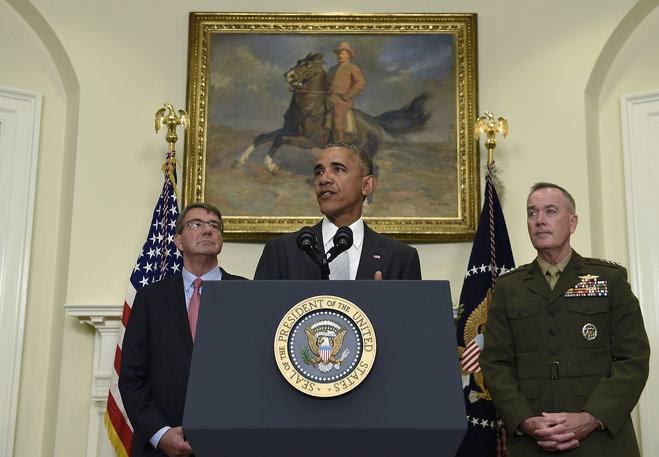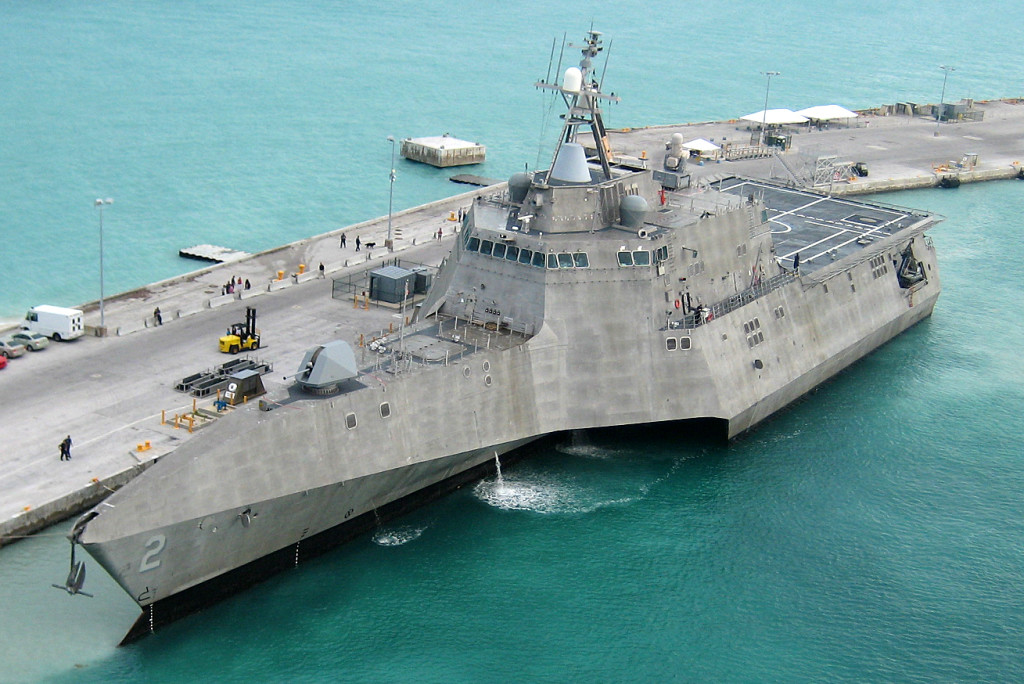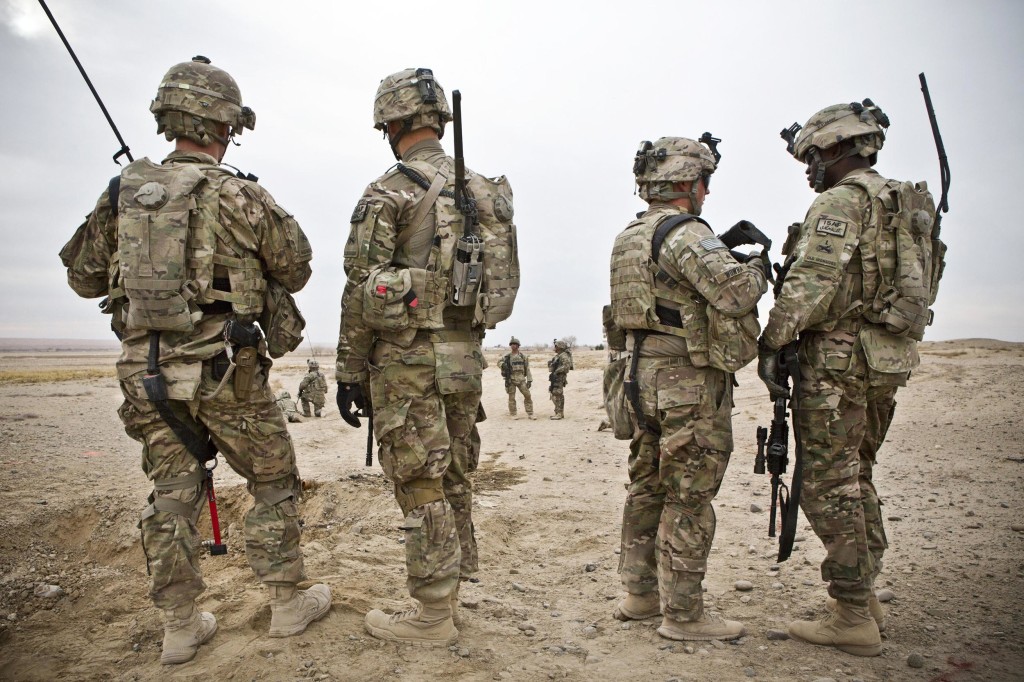Donald Trump targets F-35, but aircraft means jobs in 45 states

President-elect Donald Trump is vowing to corral the “out of control” cost of the F-35 Joint Strike Fighter. But congressional Republicans and Democrats, aware of the tens of thousands of jobs the aircraft generates in 45 states, will be wary of any plans by Trump to cut the program. A Monday morning tweet from Trump targeting the F-35 doesn’t explain exactly how he’ll save billions of dollars in military purchases while also honoring a campaign vow to rebuild the armed forces. Once Trump is in office, he can propose deep cuts to the F-35 or even elect to cancel the program altogether. But Congress, not the president, controls the government’s purse strings and makes the final decisions about the budget. Built by defense giant Lockheed Martin, the nearly $400 billion price tag for the F-35 makes the program the Pentagon’s most expensive weapons acquisition ever. Despite the huge cost, the program has strong bipartisan support in Congress, where lawmakers view the aircraft as essential to national security. After Trump’s tweet, Lockheed Martin’s shares tumbled, wiping out nearly $4 billion of the company’s market value. The F-35 program made up 20 percent of Lockheed’s total 2015 revenue of $46.1 billion. U.S. government orders made up 78 percent of its revenue last year. “Whoever has this airplane will have the most advanced air force in the world. That’s why we’re building the F35. That’s why it’s important to not only the U.S., our partners and our partners like the Israeli Air force to have this airplane,” said Jeff Babione, general manager of the F-35 program, at a base in Israel. Israel and several other U.S. allies are also buying the F-35, expanding the program’s international footprint. Defense Secretary Ash Carter visited Israel on Monday as Tel Aviv received the first two next-generation F-35 fighter jets that will help preserve the country’s military edge in the volatile Mideast. The F-35, which uses stealth technology to avoid being detected by radar, is being built in different configurations to be used by the Air Force, Navy and Marine Corps. The Navy’s version, for example, is designed to take off and land on an aircraft carrier. Current plans call for the United States to buy nearly 2,500 F-35s. Close to $13 billion will be needed annually between 2016 and 2038 to hit that procurement number, according to the Government Accountability Office. While the F-35 had massive budget overruns early on, the cost has stabilized and even dropped a bit following tough negotiations between the Pentagon and Lockheed Martin, according to Todd Harrison, a defense budget expert at the Center for Strategic and International Studies. “Trump is unlikely to squeeze more blood out of this rock,” Harrison said. Lockheed said that it has worked to lower the price of the F-35 by 60 percent and expected the aircraft to cost $85 million each in 2019 and 2020. But the company’s estimate appears to omit the price of the engine and the cost of development. When those elements are added in, the cost per F-35 in current-year dollars is closer to $138 million, according to Harrison. Companies from 45 states are involved in the F-35’s production, with Texas, Georgia, California, Arizona and Florida playing the leading roles in testing and manufacturing the jet fighter. The company is teamed with more than 1,250 domestic suppliers to produce thousands of components ranging from highly sophisticated radar sensors to parts of the aircraft’s fuselage, according to Lockheed Martin. Overall, the F-35 program is responsible for more than 146,000 U.S. jobs, the company said. The Lockheed Martin plant where the F-35 is being built is located in Texas Republican Rep. Kay Granger‘s district. She’s vice chair of the defense appropriations subcommittee. Rep. Mac Thornberry, the Republican chairman of the House Armed Services Committee, represents the district next door to Granger’s. In a statement Monday, Granger hailed the F-35 delivery to Israel, calling the aircraft “what we need to keep our two countries safe in these dangerous times.” Thornberry’s committee has supported buying more F-35s than the Obama administration had asked for in its budget request. The F-35 will replace an aging inventory of U.S. aircraft that many lawmakers believe are becoming increasingly unsafe to fly. Claude Chafin, a committee spokesman, said Thornberry “shares the president-elect’s determination to have the Pentagon get weapons in the hands of our troops faster, while being better stewards of the taxpayer dollar.” The tweet on the F-35 marks the second time in a week Trump has blasted U.S. aircraft spending. Last week, he tweeted that costs to build new presidential planes by Boeing Corp. were “out of control” and ended the tweet with “Cancel order!” Republished with permission of The Associated Press.
U.S. defense secretary in Israel as country gets F-35 jets

U.S. Defense Secretary Ash Carter was visiting Israel Monday as it prepared to receive the first two next-generation F-35 fighter jets that will help preserve the country’s military edge in the volatile Mideast. The F-35 is the Pentagon’s most expensive weapons program, with an estimated cost of nearly $400 billion. Israel is among a small number of allies to get the plane. Israeli Defense Minister Avigdor Lieberman said the fighter jets “present another component in maintaining air superiority in our region” and expressed gratitude to Carter, who was welcomed with a military honor guard at a Tel Aviv army base. The jets were supposed to touch down in Israel in the early afternoon, but the Israeli military said their arrival was delayed due to weather conditions in Italy. Neither U.S. nor Israeli officials provided further details. The deputy commander of the Nevatim Air Force base in southern Israel said the new fighters will give Israel an upper hand over its neighbors for years to come. “We are going to be very strong for a long time, having these airplanes. And Israel has to be strong in this region for its existence,” said Col. Asaf, who could be identified only by his first name in line with military regulations. “It’s a message for everybody that Israel will keep on holding the high-end technology in this area.” The purchase of the F-35 elevates the entire Israeli air force to a higher level, the colonel said, adding that four Israeli pilots have been trained to fly the planes and that more will be shown how to use them. “This specific airplane is going to be a very good one for the next decades,” he said. In November, a senior Israeli air force official described the arrival of the F-35 as a game-changer, citing its various cutting-edge systems, which would preserve Israel’s ability to act freely in hostile airspace. He cited its long-range capability, its provision of critical data in real time and a stealth system that can evade or delay detection by the world’s most sophisticated radar systems. Speaking on condition of anonymity under military briefing guidelines, he said it would take “more than a few months” for the first planes to be operational. In recent years, Israel has reportedly carried out long-range airstrikes as far away as Sudan, and is believed to have struck Hezbollah-bound weapons shipments in neighboring Syria. Israel has also hinted in the past at making plans to strike Iran, some 1,000 kilometers (625 miles) away, if the Islamic Republic presses forward with its nuclear program. The threat of Israeli action in Iran has dropped since last year’s nuclear accord. The Pentagon’s F-35 program has been criticized by members of the U.S. Congress over testing problems, delays and cost overruns. International buyers include Britain, South Korea, Israel, Italy, Australia, Canada, Turkey and Japan. While the planes were stuck in Italy, U.S. President-elect Donald Trump lashed out against the program. “The F-35 program and cost is out of control,” he tweeted. “Billions of dollars can and will be saved on military (and other) purchases after January 20th,” he wrote. Prime Minister Benjamin Netanyahu‘s office announced last month that his Security Cabinet approved the purchase of 17 additional F-35s. In all, it said, the acquisition will bring the number of planes the air force will receive to 50. Republished with permission of the Associated Press.
Pentagon chief Ash Carter: Don’t extend stopgap funding through May

Defense Secretary Ash Carter Tuesday warned Republican leaders in Congress that plans to operate the Pentagon on autopilot through as late as May are “unprecedented and unacceptable.” Carter said such plans would freeze the sprawling department’s budget for too long and harm national security. GOP leaders are negotiating over the duration of a stopgap spending measure to keep the Pentagon and most of the rest of the government operating after the current temporary funding bill expires next Friday. House Republicans initially said the next stopgap measure, called a “CR” in Washington parlance, would run through March 31 but Senate Majority Leader Mitch McConnell, R-Ky., wants a later date because the Senate will be so busy with a crush of business under the incoming Trump administration. “A short-term CR is bad enough, but a CR through May means DoD would have to operate under its constraints for two-thirds of the fiscal year,” Carter said. “This is unprecedented and unacceptable, especially when we have so many troops operating in harm’s way.” McConnell had initially pressed to wrap up the remaining 11 appropriations bills – totaling more than $1 trillion – by the end of this year. But House Speaker Paul Ryan, R-Wis., bowed to the wishes of the incoming administration and demands by conservatives to punt the unfinished legislation into next year. Some Republicans believe they’ll get a better deal next year from Trump than they would from President Barack Obama – including more Pentagon funding and policy “riders” to reverse Obama regulations – but top aides say the legislative outcomes probably won’t be much different. Carter also warned of delays in procurement of new weapons such as transport and attack helicopters, a new in-flight tanker for the Air Force, and a next-generation nuclear submarine. Republished with permission of the Associated Press.
Investigation report faults top Pentagon aide’s behavior

A Pentagon investigation has concluded that Defense Secretary Ash Carter‘s former senior military aide used his government credit card at strip clubs or gentlemen’s clubs in Rome and Seoul, drank in excess and had “improper interactions” with women, The Associated Press has learned. The aide, Maj. Gen. Ron Lewis, who was fired nearly a year ago by Carter, submitted a written rebuttal slamming the investigation. Lewis asserted that the Defense Department’s inspector general had amassed an inaccurate and inflammatory case based on innuendo and had failed to “find the truth.” The inspector general’s report says Lewis improperly used his credit card, lied to a bank to get charges removed and said he was guilty of conduct unbecoming an officer, a violation of the code of military justice, according to people familiar with the report. They spoke on condition of anonymity because they weren’t authorized to discuss the report before its release. In the rebuttal, obtained by the AP, Lewis denied that the bar he went to in Rome was a strip club and denied that he went to a strip or gentleman’s club in Seoul, South Korea, in an area of the city that the report calls “Hooker Hill.” Kathie Scarrah, the inspector general’s spokeswoman, confirmed that Lewis was investigated for allegations that he “misused his government travel charge card for personal expenses; made false official statements regarding his government travel card misuse; and engaged in other inappropriate behavior.” She provided no other details, but said the inspector general substantiated the allegations and recommended the Army “take appropriate action.” The full report has not yet been made public. It was expected to be released Thursday. Carter issued a statement saying he was briefed on the investigation but would defer comment pending an Army review. More broadly, he said, “I expect the highest possible standards of conduct from the men and women in this department particularly from those serving in the most senior positions. There is no exception.” The report will go to Army leaders who will determine what, if any, punishment is required and at what rank Lewis would be able to retire “The Army takes allegations of misconduct seriously and demands all senior leaders, regardless of rank, uphold the highest standards of moral character and competence,” said Army spokesman Col. Pat Seiber. Lewis took responsibility for several inappropriate actions, including charging nearly $1,800 on his government credit card at what he called a “dance club” in Rome. In an embarrassing set of circumstances, Lewis said he tried to use his personal debit card at the club, but it didn’t work, so he had to walk back to his hotel with a female employee of the club, and wake up a Defense Department staff member to get his government card to pay the bill. He said he paid back the charges when he returned to the U.S. The report identified the club as Cica Cica Boom, but Lewis said that’s not the club he went to. He said he went to a “high-end establishment with a respectable clientele that had a DJ, a bar area and a dance floor where couples were dancing.” A photo of Cica Cica Boom shows a sign above the doorway that also advertises lap dances there. Lewis had shot up the promotional ladder, and his job with Carter stemmed from their close professional relationship. He had served as an aide for Carter when Carter was deputy defense secretary. In Korea, the report said, Lewis went to a gentleman’s club called the Candy Bar. Lewis denied going there as well, but acknowledged being in a commercial area of Seoul. He said that when he returned to Washington and saw two charges on his credit card totally about $1,100, he called the bank to have them removed and the bank agreed. Investigators presented him with two receipts from the club bearing the name “Candy.” Both receipts show only a short pen mark in the signature area, and do not show his written name. The report says investigators, after getting Lewis’ rebuttal, went back and checked their information, and said they stand by their findings. The report portrays a senior officer who often went out alone on overseas trips, and who sometimes drank in excess. The report also describes a night in Hawaii last November – just days before Lewis was fired – when he went to dinner and later went back to his room with an enlisted service member. The report says she told investigators that Lewis approached her and appeared to want to kiss her, but she stopped him and left. Lewis said another staff member was in the hotel room for much of the time, and that even when he was alone with the enlisted service member “our discussions remained the type of conversation a command team would engage in.” He said he has known the unidentified service member for several years. The report also describes Lewis sharing a cigar with a female Defense Department staff member during drinks in Malaysia with a large number of other staff and journalists. It says others there said they were uncomfortable with Lewis’ actions and said he was sitting too close to the staff member. The report does not suggest that Lewis had an extramarital affair or that he had sex with any of the women. And Lewis, in his rebuttal, criticizes the report for relying on insinuations and statements from people who may have distorted the facts or didn’t actually see what happened. Officials with knowledge of the matter said the allegations of misconduct, which first surfaced after the November overseas trip with Carter, stunned the secretary and sent shockwaves through the Pentagon. Republished with permission of the Associated Press.
Pentagon officials draw sharp questions from GOP on Syria

The nation’s top military officials faced sharp questions on Thursday from Republicans angry that the Obama administration is not taking more aggressive steps to end the 5-year-old-civil war in Syria. A senior GOP senator dismissed Secretary of State John Kerry as “intrepid but delusional” for trying to work with Russia. Defense Secretary Ash Carter and Gen. Joseph Dunford, the chairman of the Joint Chiefs of Staff, testified before the GOP-led Senate Armed Services Committee after the latest attempt to secure a cease-fire in Syria all but collapsed. Republicans are skeptical, even hostile, to the idea that Russia is a willing partner for peace and would work with the United States to combat Islamic State militants and al-Qaida. Sen. John McCain, R-Ariz., the committee’s chairman, opened the hearing by saying that the administration “still has no plausible vision of an end-state for Syria.” Instead, McCain said that while Russian and Syrian aircraft “bombed hospitals, markets, aid warehouses, and other civilian targets, President Obama sent his intrepid but delusional secretary of state to tilt yet again at the windmill of cooperating with” Russian President Vladimir Putin. Sen. Lindsey Graham, R-S.C., a defense hawk and one of President Barack Obama‘s most vocal critics, said he anticipated the hearing will be contentious because of mounting frustration among lawmakers over a lack of a coherent strategy for ending the conflict. “I expect this to be confrontational,” Graham said. “At the end of the day, I think Congress needs to challenge what’s going on in Syria.” The failure to establish a no-fly zone in the country’s north to protect Syrians from the bombing has been a mistake, according to Graham, and he also criticized the reliance on Kurdish fighters the U.S. has been supporting in the fight against the Islamic State. Although the battle-hardened Kurds have proven to be effective, their success has alarmed Turkey, which is grappling with a Kurdish insurgency in its southeast. Although Turkey has repeatedly called for a no-fly zone, the Obama administration has resisted, unwilling to wade too deeply into an intractable conflict. Tensions between Russia and the United States have only heightened in recent days after authorities in Washington determined with a very high degree of confidence that an attack on a humanitarian aid convoy in Syria earlier this week was carried out by a Russian-piloted aircraft. The assessment laid more deliberate blame on Moscow for the strike on the Syrian Arab Red Crescent convoy, which killed 20 civilians. Washington had said Tuesday that Russia was to blame, but that the strike delivered by a Russian-made Su-24 could have been carried out by Russia or Syria. Both militaries use Su-24 fighter jets. But officials said Wednesday the U.S. has gathered enough intelligence to say that it was Russia, not Syria, that launched the airstrike. Kerry called for all warplanes to halt flights over aid routes and at a U.N. Security Council session he raised “profound doubt” about the willingness of Russia and Syria to abide by the cease-fire. The Sept. 9 truce envisioned a U.S.-Russian military partnership against the Islamic State and al-Qaida if violence was reduced and aid delivered over the course of seven continuous days. The Pentagon, however, voiced reservations about coordinating air strikes and sharing intelligence with Russia. McCain assailed the potential partnership, saying it would “mean that the U.S. military would effectively own future Russian airstrikes in the eyes of the world.” Republished with permission of the Associated Press.
Barack Obama announces decision to leave 8,400 troops in Afghanistan aids allies

President Barack Obama‘s decision to slow the withdrawal of American troops from Afghanistan will be welcomed at the NATO summit this weekend, providing aid for allied forces in the country and bolstering U.S. efforts to get more pledges of support for the war from U.S. allies. Obama’s move quells lingering questions within NATO about America’s commitment to the ongoing conflict. And it will allow the U.S. military to expand its work with Afghan forces as they face a resurgent Taliban and a troubling presence of Islamic State fighters in the country. The president announced Wednesday that he will leave 8,400 U.S. troops in Afghanistan into 2017, rather than cut the force to 5,500 at the end of the year as initially planned. Military commanders, members of Congress and allied leaders had pressured the administration to maintain the current 9,800 troops in Afghanistan. The issue will be discussed at the NATO summit in Warsaw, including U.S. plans to encourage allies to strengthen their commitments to Afghanistan, with more funding, troops, or other support. Last month, NATO allies agreed to extend their Afghanistan training mission and keep troops in all four sections of the country in 2017. Those decisions shelved earlier plans to consolidate forces in and around Kabul next year, ending the current hub-and-spoke system. The NATO decision, however, relied on the U.S. remaining in Afghanistan to provide security, logistics and other support for the allies, particularly German troops working with Afghan forces in the north and Italian troops doing the same in the west. Defense Secretary Ash Carter told NATO allies last month that the U.S. would continue that support. But U.S. officials quietly acknowledged that maintaining that support would be difficult with only 5,500 U.S. troops, as Obama planned. Obama announced last month that he was authorizing U.S. forces to once again conduct airstrikes against the Taliban when needed in critical operations, and that American troops would accompany and advise Afghan conventional forces on the ground, much as they have with Afghan commandos. Doing all of that with 5,500 troops would be risky, officials said. “It just thins you out enormously, and so you just end up with a multiple higher level of risk,” said retired Adm. James Stavridis, the former NATO commander. “If you go down to 5,500 troops, your risk goes up vertically because your allies don’t stay with you and because you have half the capacity.” Stavridis, now dean of the Fletcher School at Tufts University, added that it would be hard to maintain the hub-and-spoke allied presence in the north and west without keeping at least 8,000 U.S. troops in the country. Obama acknowledged the “precarious” security situation in Afghanistan during his troop announcement at the White House on Wednesday, saying he would not allow any group to use Afghanistan “as a safe haven for terrorists to attack our nation again.” “It is in our national security interest – especially after all the blood and treasure we’ve invested in Afghanistan over the years – that we give our Afghan partners the very best opportunity to succeed,” Obama said. Obama came into office promising to end the wars in Afghanistan and Iraq, but this decision ensures that he’ll leave with the U.S. still enmeshed in conflicts in both of those countries while wrestling with new ones in Syria and Libya. The president said the U.S. mission would remain narrowly focused on “training and advising” Afghan forces and supporting counterterrorism operations against the remnants of al-Qaida, the group that attacked the U.S. on Sept. 11. Republican leaders in Congress who favor a larger force said Obama’s new plan was preferable to the old one, but they criticized him for not keeping the full 9,800. Sen. Lindsey Graham, R-S.C., said the partial drawdown would increase the dangers for the remaining troops, calling it “more a political decision by President Obama than a military one.” Though Obama touted progress in Afghanistan, including better-trained security forces, the situation remains perilous, with Afghan battlefield deaths rising and civilian casualties hitting a record high. Progress in stabilizing Afghanistan has been undermined by the resurgence of the Taliban, which were removed from power in the 2001 U.S.-led invasion but have lately stepped up their deadly attacks. Republished with permission of the Associated Press.
Pentagon revokes controversial transgender ban for U.S. military

Defense Secretary Ash Carter on Thursday removed one of the final remaining barriers to military service by lifting the Pentagon’s ban on openly transgender people serving in the U.S. military. “Effective immediately, transgender Americans may serve openly,” Carter said at a news conference. “They can no longer be discharged or otherwise separated from the military just for being transgender.” Carter continued, “Our mission is to defend this country, and we don’t want barriers unrelated to a person’s qualification to serve preventing us from recruiting or retaining the soldier, sailor, airman or Marine who can best accomplish the mission. We have to have access to 100 percent of America’s population for our all-volunteer force to be able to recruit from among them the most highly qualified — and to retain them.” Alabama 1st District U.S. Rep. Bradley Byrne, a member of the House Armed Services Committee, was quick to weigh in on the Pentagon’s decision. “It is frustrating the Pentagon now has a strategy for transgender service members, but they still lack an actual strategy for defeating radical Islamic terrorism,” said Byrne in a news release. “Once again it seems the Obama Administration is more interested in advancing a political agenda than they are in proposing sound policy.” According to Carter, within 90 days the Pentagon will create a guidebook for commanders on rules regarding transgender service members as well as medical guidance to doctors. Within one year, transgender individuals will be allowed to join the armed forces, provided they have been “stable” in their preferred gender for 18 months, he continued. Lifting the transgender ban was the latest move in a series of controversial cultural changes in the military in recent years — from the 2011 decision to end the “Don’t Ask, Don’t Tell” policy barring gays and lesbians from serving openly, to Carter’s December 2015 decision lifting restrictions on women serving in combat roles. Many critics have called Wednesday’s decision “social engineering” that risks troop readiness and the ability to fight. Family Research Council President Tony Perkins, a Marine Corps veteran, said President Barack Obama was using the military “to fight culture wars.” “This is yet another example of President Obama using America’s military to fight culture wars instead of to fight real wars against the enemies of our nation,” Perkins said in a prepared statement. “Considering the abysmal condition of our military and a decline in readiness, why is this a top priority for the Obama administration?” Perkins continued. “Before changing any policy, the impact on military readiness has to be the first consideration. Defense Secretary Carter has failed to explain how this new policy makes our military more capable of winning wars.” Rep. Byrne shares Perkins’ concern over troop readiness. “As a member of the House Armed Services Committee, I am committed to holding the Obama Administration accountable and ensuring their political agenda does not directly harm our military readiness,” Byrne concluded.
GOP-led House moves ahead with bill to boost military budget

Defying a veto threat, the GOP-led House is pressing ahead with debate on a $602 billion defense policy bill that seeks to halt an erosion of the U.S. military’s combat readiness by purchasing more weapons and forbidding further cuts in troop levels. The legislation also proposes greater oversight of the White House’s National Security Council, prohibits prisoners held at the Guantanamo Bay, Cuba, detention facility from being moved to the U.S., and gives U.S. service members a higher pay raise than the Pentagon recommended. A vote on the bill is expected Wednesday. In a 17-page statement on the policy bill, the White House detailed its objections to numerous provisions and said President Barack Obama would reject the legislation if it reached his desk. Among the measures the Obama administration opposes is a Republican plan to shift $18 billion in wartime spending to pay for additional ships, jet fighters, helicopters and more that the Pentagon didn’t request. To make up for the shortfall in the wartime account, Obama’s successor would submit a supplemental budget to Congress in early 2017, according to U.S. Rep. Mac Thornberry, R-Texas, the plan’s architect and the chairman of the House Armed Services Committee. He and other proponents of the spending increase say it is essential to halt a decline in the military’s ability to respond to global threats that has worsened on Obama’s watch. But Defense Secretary Ash Carter has called the plan a “road to nowhere” that actually degrades combat readiness by retaining troops and buying equipment that can’t be sustained, effectively creating a hollowed out force. In a speech Tuesday, Carter said that the proposal “risks stability and gambles with war funding, jeopardizes readiness, and rejects key judgments of the (Defense) Department.” The House bill would block reductions in the number of active-duty troops by prohibiting the Army from falling below 480,000 active-duty soldiers and adding 7,000 service members to the Air Force and Marine Corps. The legislation also approves a 2.1 percent pay raise for the troops — a half-percentage point higher than the Pentagon asked for in its budget submission. Republicans sidestepped a thorny debate over whether women should be required to sign up for a potential draft after the House Rules Committee stripped from the bill a provision to erase Selective Service gender restrictions. In its place was a measure to study whether the Selective Service is even needed at a time when the armed forces get plenty of qualified volunteers, making the possibility of a draft remote. The U.S. has not had a military draft since 1973, in the waning years of the Vietnam War era. A growing number of lawmakers have suggested abolishing the Selective Service, which costs $23 million a year to operate. “It’s like rethinking dinosaurs,” said U.S. Sen. John McCain, R-Ariz., the chairman of the Senate Armed Services Committee. “They’re not coming back. The draft is not coming back.” Republicans approved an amendment authored by Thornberry to curb what they say is micromanagement of military operations by National Security Council staff. Thornberry said he has personally heard from troops in combat who have received intimidating calls from junior White House staffers even though their role is to coordinate policy and advise the president. To increase oversight and accountability, Senate confirmation of the president’s national security adviser would be required if the size of the National Security Council staff exceeds 100 employees, according to the amendment. Republicans have inserted into the bill a longstanding ban on moving prisoners held at Guantanamo Bay to the United States. The embargo has kept Obama from fulfilling a campaign pledge to shutter the facility. The White House said the restrictions interfere with the executive branch’s authority to decide when and where to prosecute prisoners. The legislation also rejects the Pentagon’s request for another base closure round and adds money to restore and modernize military facilities. The Defense Department wants to shutter excess bases and installations and use the savings to strengthen the armed forces. Republished with permission of The Associated Press.
Bradley Byrne: Defense bill blocks attempt to cut Mobile shipyard

Southwest Alabama has a proud military tradition. Our area is home to a large number of veterans. The Coast Guard has a strong presence here. Important military vessels are constructed up and down the Gulf Coast. These are all things we take great pride in. That’s why it was so frustrating last December when Secretary of Defense Ash Carter announced his plans to cut the Littoral Combat Ship (LCS) program from 52 total ships to just 40. The LCS is the Navy vessel built at Austal USA in Mobile. Over 4,000 men and women are directly employed by the shipyard. Two different versions of the LCS are currently built by Austal in Mobile and Marinette Marine in Wisconsin. The Secretary also proposed eliminating one of the versions entirely in a “downselect” to a single builder. Navy officials testified before Congress that this would result in one of the shipyards closing entirely. I immediately went to work to make sure his efforts would not be successful. When the President’s budget was released and included the proposed cuts, I doubled down in my efforts. Ultimately, it is the decision of Congress, not a lame-duck President and a lame-duck Secretary of Defense. Let me be clear up front: I don’t support the LCS program simply because it is built in our area. I support the program because the Navy has made clear time and time again they like the LCS, and they need the ship in order to fulfill their mission. If these ships weren’t critical to the Navy, then I wouldn’t have a leg to stand on. So, I set out to stop these proposed cuts. In Congress, I serve on the House Armed Services Committee, which has jurisdiction over our nation’s entire military. Each year, the Committee must pass legislation known as the National Defense Authorization Act (NDAA). This is the bill that sets policy and authorizes funding for military operations and programs. As part of his efforts to cut the program, President Obama’s budget only requested funding for two Littoral Combat Ships this year, instead of the required three ships. My goal was [to] make sure the NDAA included full funding for three ships while also stopping the cuts from moving forward. I’m pleased to report that our efforts were successful, and the NDAA includes funding for three ships. I also introduced an amendment to prevent the Pentagon from following through with their plans to eliminate one of the two builders. My amendment was adopted without any opposition. Ultimately, the NDAA passed the full Armed Services Committee early Thursday morning after more than fifteen hours of debate. In a sign of the truly bipartisan nature of our committee, the bill passed by a vote of 60 to 2. This was a resounding victory for all the men and women who work at the Austal shipyard in Mobile. This means both Republicans and Democrats agree that President Obama is wrong for trying to cut the LCS program, which is so important to the Navy. More challenges may arise, but I promise to keep fighting for the LCS, the Navy, and the people who work at that shipyard. Most importantly, I promise to keep fighting for Southwest Alabama and our proud military traditions. • • • Bradley Byrne is a member of U.S. Congress representing Alabama’s 1st Congressional District.
Bradley Byrne fights efforts to cut shipbuilding program with Alabama ties

Congressman Bradley Byrne joined 45 other members of Congress in fighting back against an effort by the Obama administration to cut the Littoral Combat Ship (LCS) program, which has a significant presence in South Alabama through Austal USA. Austal, which recently won an award for large Alabama manufacturer of the year, employs more than 4,000 to build and deliver twenty ships to the U.S. Navy, with four more currently in production. Last year Defense Secretary Ashton Carter sent a memo to the U.S. Navy ordering the branch to decrease its LCS and frigate buy by 12 ships. According to a budget request submitted in February, the U.S. Navy complied with the request, cutting purchases of LCS from 52 to 40 vessels over the next five years. “The LCS program is critical to the future of the Navy, and I am pleased to have so many of my colleagues join me in fighting back against these proposed cuts,” said Byrne in a press release Tuesday. “The LCS program has been studied time and time again, and each time it becomes even more clear that we need 52 of these ships in order to properly defend our nation and keep sea lanes around the world open for commerce. I will continue working every day to protect the LCS program and the men and women who serve in the U.S. Navy.” The letter was signed by a wide range of lawmakers, including all seven of Alabama’s congressional delegation as well as congressmen and women from 19 states, including 32 Republicans and 14 Democrats. Sent to the leadership of the House Armed Services Committee, the letter urges the committee to reject the administration’s request. “This budget proposal comes from a President and Secretary of Defense who have less than a year remaining in office,” the letter states. “It defies logic to make significant changes to a program that was thoroughly studied and evaluated less than two years ago.” The House Armed Services Committee will begin consideration of the 2017 National Defense Authorization Act (NDAA) this week.
Bradley Byrne: We still don’t have a strategy to fight ISIS

For over a year now, I have been pointing out that the Obama Administration lacks a clear strategy to defeat the Islamic State of Iraq and Syria (ISIS). This is the brutal terrorist organization that holds significant territory in the Middle East and claims responsibility for attacks in Brussels, Paris, and San Bernardino, California. When I visited the Middle East a few years ago, ISIS was gaining power and influence. In each country, I heard from American allies who were worried about ISIS and the lack of leadership from the United States. No one expected the United States to lead the fight alone, but they looked to us for guidance. Instead of leading, the President called ISIS a “JV team” and refused to acknowledge that our actions in Syria and Iraq were contributing to ISIS’s growth. At the same time, Syria was engaged in a violent civil war and Iraq’s military was falling apart. The United States has since started air strikes intended to disrupt ISIS operations and kill ISIS leadership. A few other countries have joined those efforts, but we still lack the large-scale support from U.S. allies that is needed to defeat ISIS. Don’t get me wrong: a number of American service members are doing a valiant job to defeat the enemy, but Administration has not given them a winning strategy. In other words, it doesn’t matter how great the athletes are on a football team if the coach does not have a game plan on how to win the game. That’s the challenge facing our military today. With this in mind, Congress included a provision in the annual National Defense Authorization Act last year that required the Obama Administration to submit a plan outlining their strategy for the Middle East and to defeat ISIS. The law couldn’t have been clearer. It said the report should be submitted to Congress “not later than February 15, 2016.” Well, February 15th came and passed without a plan being submitted to Congress. A few weeks ago, Secretary of Defense Ash Carter, who was responsible for submitting the report, testified before the Armed Services Committee about his annual budget request. I used the hearing to ask Secretary Carter why he had failed to submit the report on time as required by law. When an average American violates the law, there are consequences. The same should apply to leaders in the federal government. No one, regardless of their political position, should ever be above the law. I asked the Secretary where the report was and if he agreed the law was broken. Secretary Carter failed to answer my questions and simply said the report’s release was “imminent.” Well, two days later and over a month late, the report was submitted to Congress. It was only seven pages long and lacked a clear strategy. It reminded me of a kid who forgot to do their homework, so they recklessly threw something together at the last minute. Either the Obama Administration didn’t take the request from Congress seriously or they actually don’t have a strategy to defeat ISIS and combat Islamic extremism in the Middle East. I fear that both of those are true. Only the President, as the Commander-in-Chief of the military, can put forward a strategy for our military. So far, President Obama has failed to do that and ISIS continues to grow. In Congress, it is our job to continue holding the President and his advisors to the fire until they follow the law. As a member of the Armed Services Committee, I will continue doing just that. The safety and security of the American people require it. • • • Bradley Byrne is a member of U.S. Congress representing Alabama’s 1st Congressional District.


